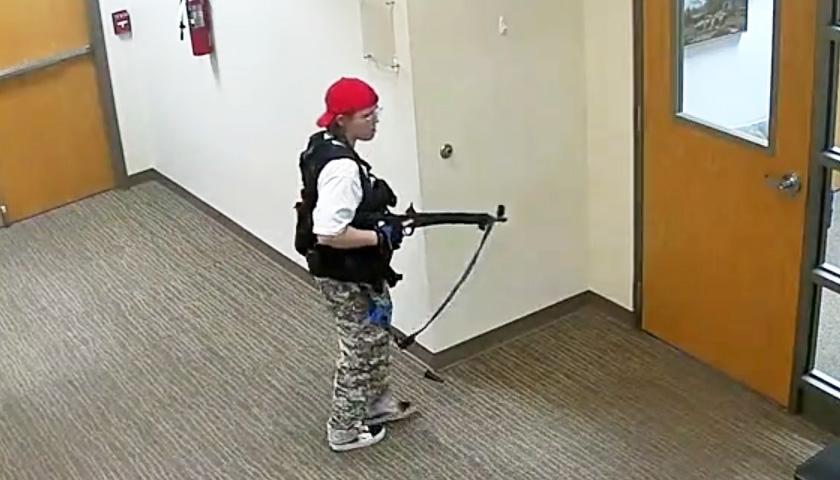Live from Music Row, Wednesday morning on The Tennessee Star Report with Michael Patrick Leahy – broadcast on Nashville’s Talk Radio 98.3 and 1510 WLAC weekdays from 5:00 a.m. to 8:00 a.m. – host Leahy welcomed Tennessee Attorney General Jonathan Skrmetti in studio to talk about his ongoing cases regarding abortion drugs, social media bias, and the designation of Mexican drug cartels as foreign terrorist organizations.
Leahy: In studio, the original all-star panelist, Crom Carmichael. And we are delighted to welcome back to our studios and our microphones, the attorney general of the State of Tennessee, Jonathan Skrmetti. Welcome, General Skrmetti.
Skrmetti: Thank you for having me back. It’s great to be here.
Leahy: It’s always great to have you in studio. And you’ve been in office now since September 1st. You have an eight-year term appointed by the Tennessee Supreme Supreme Court. It’s been a busy, busy several months, hasn’t it?
Skrmetti: When I started, I felt like I’d been shot out of a cannon, and I figured at some point it would slow down. And it hasn’t really slowed down, but it’s great. It is such a privilege to get to do this, and there are so many good fights worth fighting, and I’ve got a terrific team. We’re doing all sorts of great things for the people of Tennessee. It is an honor to have the job.
Leahy: Let’s catch up with some things. It’s been hard for me to keep track of all the things you’ve been doing because there’s a lot of stuff, and there are so many issues, especially having to do with the usurpations of the powers of state governments and individuals by the national federal government.
So here’s one. You recently filed a brief challenging the FDA’s defiance of federal and state law in approving abortion drugs. You’re part of a 22-state coalition. Tell us a little bit about that.
Skrmetti: Sure. The Supreme Court decided the Dobbs case that said that abortion regulation is up to the states and that the state governments have the authority to decide what the law around abortion should be. The federal government immediately tried to circumvent that, and one of the ways that they did it was by approving abortion drugs via the mail through the FDA.
And there is a federal law that explicitly says you can’t send abortion drugs through the mail. In addition, the FDA is not allowed to supersede state law with respect to certain things, including the legality of abortion.
So this is an attempt by the federal government to reinsert itself into an issue that is clearly the state’s responsibility, and it’s outside the scope of what the federal government is supposed to do.
And one of the most important parts of my job is to draw bright lines and say to the federal government, you do federal things, and you leave the state things to the state governments. And this is a clear example of the federal government trying to reach into state government based on a policy disagreement.
Leahy: You filed a brief with 21 other states on this. Where does that go in the legal system?
Skrmetti: My recollection is we are in the district court on this, to start, and it’ll go from there to the court of appeals, from the court of appeals potentially to the United States Supreme Court. Of course, the Supreme Court does not take many cases, so it’s likely that this will end at the court of appeals level.
And because it’s an administrative action, there’s a whole separate set of rules, the Administrative Procedure Act, that governs how this plays out. It gives us an opportunity to stop the federal government from doing this across the country based on one case.
Leahy: The famous Administrative Procedures Act of 1950, which it seems to me honored in the breach by the federal government more than the details of it.
Skrmetti: There are both constitutional issues and then APA issues that come up with all of these regulatory actions. And that’s what’s put attorney general offices into such prominence these days.
Because of the APA, because of the separation of powers, and because of a Supreme Court case called Massachusetts versus EPA, we’re able to push back against the federal government in ways that no other entity can.
Leahy: Crom Carmichael has a question for you.
Carmichael: General Skrmetti, the way you describe that is some federal bureaucrat saw the Supreme Court decision on Dobbs, didn’t like it, and just decided to do something that I suppose is clearly against the law.
Because you said, it’s very clear that there’s a federal law against sending abortion drugs via the mail. But this bureaucrat didn’t like that law either. Is there any accountability for federal employees who just break the law because they think they have the power to do so?
Skrmetti: There can be. There’s a federal law called the Antideficiency Act that regulates spending federal funds on unauthorized purposes. But you need a federal government that’s going to enforce that.
Outside of a Department of Justice that’s looking to constrain federal employees who break the law, all we can really do is stop them from doing it. We can get injunctions. We can get the courts to say what the law is, but there’s no individual accountability outside of that.
Carmichael: So could a future administration look back at actions of bureaucrats in the immediate prior administration that broke the law, and then at that point say, we’re going to hold bureaucrats who break the law accountable? Could they do that?
Skrmetti: Technically, potentially, yes. One area where I think that’s a real risk is social media censorship, where you have collusion between private companies and government actors.
And it’s very clear that if there’s a conspiracy involving some people in the government and some people outside the government to deprive somebody of a constitutional right, then there can be criminal and civil penalties for that.
Leahy: Speaking of social media bias and collusion, you’ve joined a multi-state coalition, 24 states urging Yelp to stop discriminating against crisis pregnancy centers. What’s happening there?
Skrmetti: Sure. Yelp had this consumer warning up that basically said for any crisis pregnancy center that showed up on their site. The gist of it was, these people don’t provide medical services. And it was a consumer alert that I think was designed to make people stop and think twice before contacting them.
And the purported purpose was to keep people from confusing these with abortion clinics. Of course, in Tennessee, we no longer have any abortion clinics, so that wasn’t a real justification. And crisis pregnancy centers are providing a lot of valuable services for expectant mothers and for mothers after they have their babies.
We just didn’t want Yelp to be dissuading people from going to these places. And Yelp was very accommodating. They changed the warning. Now it just says, this is not an abortion clinic, which is more accurate.
It’s not trying to steer consumers based on unjustified fear. It’s just providing accurate information, which is what they said they wanted to do. So we’re very happy with the resolution.
Leahy: So you got to win in that one with Yelp.
Skrmetti: Absolutely.
Leahy: Because they actually listened to what you said.
Skrmetti: Yes, they did exactly the right thing.
Leahy: That’s great! I wish the Biden administration would do exactly the right thing in even one instance. Speaking of the Biden administration, you have urged the Biden administration to designate Mexican drug cartels as foreign terrorist organizations. You’re part of a state 22-state coalition doing that. Where does that stand?
Skrmetti: We’re waiting to see what happens with that. But when you look at the fentanyl crisis, and you see the volume of drugs coming across the border, Chinese chemicals go to Mexican factories and get turned into fentanyl and sent into America and kill 100,000 Americans a year.
We need to do whatever we can to stop that and designate the cartels as foreign terrorist organizations and open up some additional tools that we can use to attempt to stem the tide of fentanyl coming into the country.
Listen to today’s show highlights, including this interview:
– – –
Tune in weekdays from 5:00 – 8:00 a.m. to The Tennessee Star Report with Michael Patrick Leahy on Talk Radio 98.3 FM WLAC 1510. Listen online at iHeart Radio.









What happened to getting rid of the COVID jab mandate for healthcare workers??